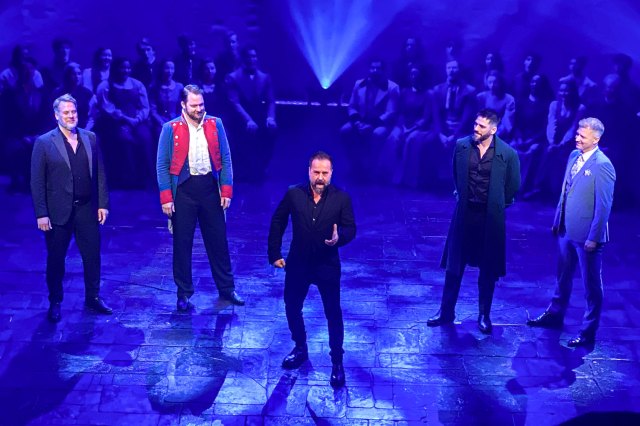Inside the Les Misérables 40th anniversary gala that proved audiences always know best
We run down the highlights from last night’s event at the Sondheim Theatre

It is a milestone that very few productions in theatre history ever reach, let alone surpass. Forty years.
Yet, as the curtain fell on the historic gala celebrating the ruby anniversary of Les Misérables at the Sondheim Theatre (a marriage between audiences and creatives that is now within touching distance of a half-century’s run), what resonated most powerfully was not the sheer passage of time, but the unflagging energy of a piece of theatre that continues to defy gravity – to steal a line from another longrunner. This was less an anniversary night and more a collective declaration of love from the theatre world to the show that changed everything.
The evening ended with a special “finale”, almost an entire third act drilling down into the production’s almost unbelievable history. Speeches from original co-director Trevor Nunn and the show’s composers Alain Boublil and Claude-Michel Schônberg offered a witty retelling of the tumultuous 1980s opening.
The central, resounding message, repeated and affirmed, was a reminder that this show survived the early drubbing from the critics thanks to the unwavering support of the public.
Nunn recalled the “two thumbs down across the board” from the press, with reviewers asking, “Who needs to be bored for three hours by a French musical?” Nunn described the transfer luncheon planned for the day after press night as having “the atmosphere was like a funeral.” However, Mackintosh then took a phone call that changed everything. The producer returned to the room and, after tapping his glass for silence, delivered the immortal news: “That was the Barbican Theatre box office on the phone. There are queues up around the block… We are transferring to the West End.” It has never looked back.
Word-of-mouth carries Les Mis from the Barbican, to the West End and beyond. This anniversary, therefore, was a pure testimonial to the power of an audience’s innate ability to recognise a classic, even when the critics missed the mark.
The celebration soon shifted to a magnificent line-up of talent. Seeing original cast members Patti LuPone (Fantine), Michael Ball (Marius), Susan Jane Tanner (Madame Thénardier) and Frances Ruffelle (Éponine) return to the stage was a theatrical event in itself. A magnificent, multi-generational Fantine/Éponine mash-up saw LuPone and Ruffelle, the originals, joined by a stellar assembly of actors who have defined the roles, including Samantha Barks, Nathania Ong, Rachelle Ann Go, Shan Ako, Katie Hall, and Carrie Hope Fletcher, who has played three separate roles in the show over the year.

An incredible seven Javerts and five Valjeans graced the stage to perform “Stars” and “Bring Him Home”, culminating in Alfie Boe delivering his trademark, spectacular key-change to complete the emotional arc of “Bring Him Home”, which quite rightly took the roof off the Sondheim.
A necessary moment of levity arrived as Matt Lucas threw himself into the role of Madame Thénardier, replete with wig, messy face and skirt. He led a barnstorming rendition of “Master of the House”.
Amid the celebratory chaos there was poignancy: the heartfelt remembrance of Herbert Kretzmer. Born on 5 October 1925, the timing of the gala, days after what would have been his centenary, allowed for a moment of collective reflection. Kretzmer was rightly hailed as more than just a translator; he was a shepherd of the piece from Paris to London, ensuring that Victor Hugo’s epic tragedy was transformed into the poetic, accessible English-language triumph that has circled the globe. The clarity and emotional weight of his lyrics remain the bedrock of the show’s international success.
Four decades on, the obvious question remains: why is Les Misérables still here? The answer, perhaps, lies in its refusal to age. While staging and orchestrations have evolved, the core narrative – a searing story of forgiveness, redemption, class warfare, and unyielding love – remains tragically timeless. It captures the essence of the human condition with an epic sweep that few modern musicals dare to attempt.
This gala proved that the people still sing because the story still matters. It is a classic not just by age, but by necessity, guaranteeing its continued residency on the West End for years to come.

















